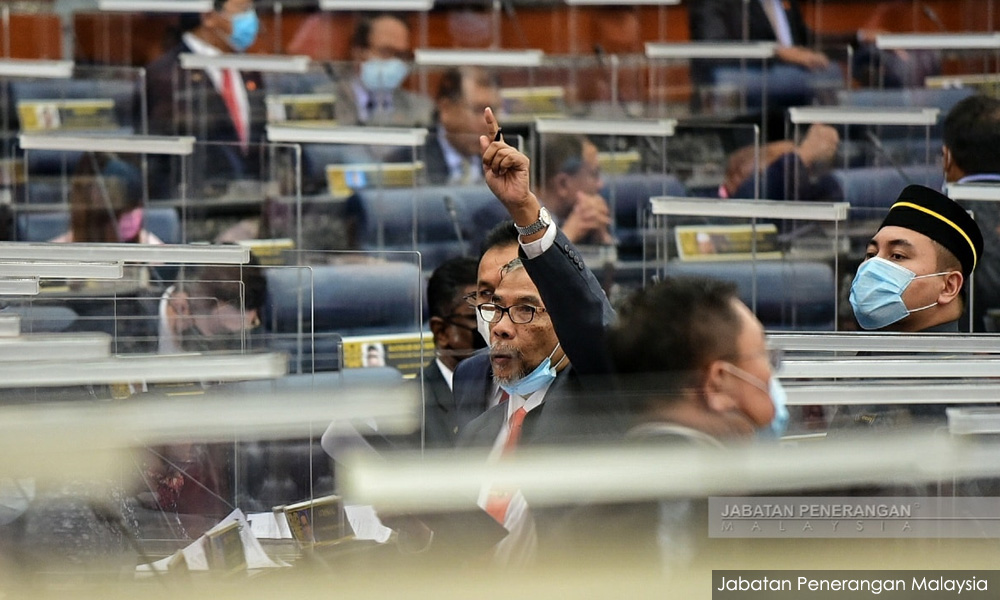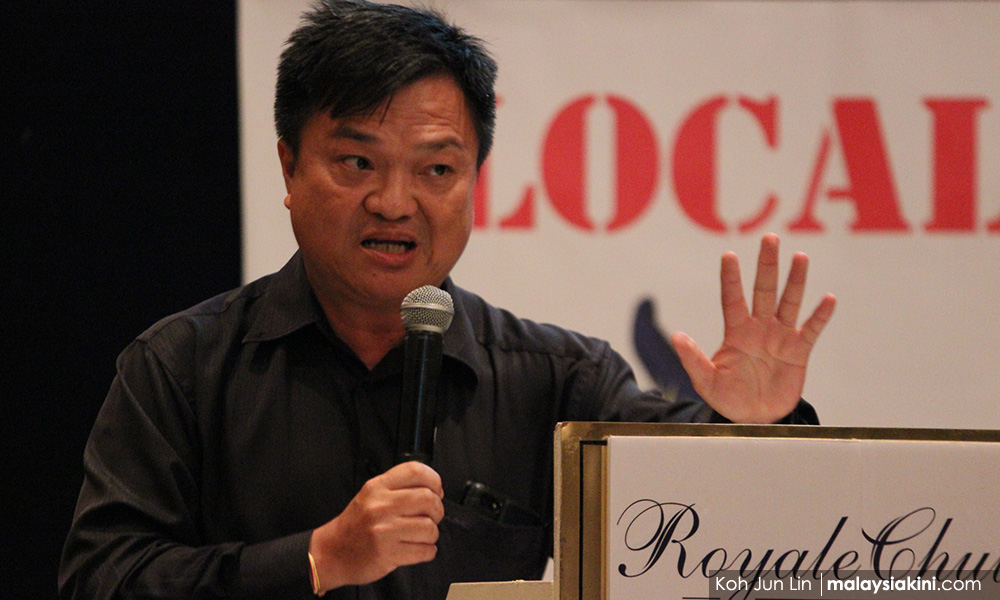Although the phenomenon of party-hopping has been observed in Malaysia for some time, it has become rampant recently.
The downfall of the Pakatan Harapan federal government, as well as the state governments in Kedah, Perak, Johor, Sabah, and Malacca, were all related to the political landscape of the lawmakers jumping ships into another party.
The political coup to betray the people's mandate has continued even in the midst of the Covid-19 pandemic raging fast and furious.
Without a doubt, the scenario of Malaysian elected politicians defecting and using the switch of allegiance to alter the government's composition poses the greatest threat to our country's democracy.
This is especially true with the current situation in Malaysia, in which the government was formed with such a narrow majority. Any shifting of parties by the MPs would certainly exacerbate political instability.
Pursuant to that, the voice calling for the enactment of legislation against party-hopping has grown louder and taken concrete form. Recently, Minister of Prime Minister's Department Wan Junaidi Tuanku Jaafar announced in the Dewan Rakyat that an anti-hopping bill would be tabled in Parliament when it meets on Feb 28.
Nevertheless, despite the belief that anti-defection legislation is the panacea for correcting the pervasive "frogging" process and restoring public trust in the democratic process, this paper will present a two-fold analysis of how the introduction of anti-hopping legislation will be detrimental to Malaysia's democracy rather than beneficial.

Anti-hopping legislation violates freedom of association
Being a democratic country, the freedom of association of elected representatives in Malaysia is a guaranteed right rooted in Article 10(1)(c) of our Federal Constitution. The MPs are allowed to cross over to a different party if they have different political ideologies from their parties.
Nonetheless, if the anti-hopping law is enacted, the assemblypersons will be restrained from joining another political party due to the fear of having their seats in Parliament expulsed or vacated.
Notably, not all political defections occur due to personal aggrandisement and rank opportunism. There may be instances where the switch of allegiance is the result of genuine prodding of conscience instead of for personal gain.
Party hopping would not necessarily be wrong, especially when the MPs switch allegiance to the opposing party because the ruling party to which he belongs becomes corrupt.
In addition, it should be noted that the argument that party hopping will undermine the public confidence in the democratic process can only stand with the assumption that the MPs were elected by constituencies based on party affiliation. However, it is not true that the assumption is applicable in all cases.
If an MP was chosen based on his personal character traits rather than the banner he represented, switching parties would not be considered a betrayal of the people's mandate.
From the above arguments, it is plausible to advocate that the elected representative should be given the right to exercise their choice to jump party according to their conscience. Nevertheless, owing to the difficulty in drawing a line on when it is acceptable for the assemblypersons to switch parties, the punitive anti-hopping legislation may, in fact, tar all the MPs that defect with the same brush.
The arrival of the anti-hopping law may render the MPs end up as "political prisoners" in their own party, with no choice but to stay in the party despite having disagreements with their leaders, realigning their political direction, or even being sacked.
Inevitably, the requirement for the lawmakers to vacate their seats if they leave their political parties or switch parties had infringed on the right to association guaranteed by Article 10(1)(c) of the Federal Constitution.
In fact, reminiscing back to Dewan Undangan Negeri Kelantan v Nordin bin Salleh, an anti-hopping law introduced in Kelantan, namely Article XXXIA in the Kelantan Constitution had been declared to be unconstitutional pursuant to the violation of the elected representatives' freedom of association.
The Supreme Court ruled that the article is null and void because it restricts the legislator's ability to disassociate from an association, rendering his fundamental right to freedom of association illusory and ineffective.
Apparently, the enactment of the anti-hopping legislation will not be the appropriate solution to counter the said issue given its nature of invading the central pillar quality of democracy, viz freedom of association.
Risk of shaping a rubber-stamp legislature
Owing to Malaysia's party whipping system, assemblypersons in their party are required to behave as a single horde, support their party's position, and vote in accordance with their party line. The party's MPs are unable to go off on their own, attempting to be independent or "vote according to their conscience".
With the current state of affairs in Malaysia, passing the anti-hopping bill would only risk turning our legislature into a rubber-stamp legislature, where, in Professor Shad Saleem Faruqi's words, the Parliament "legitimises but does not legislate".
It must be borne in mind that an effective anti-hopping law would disqualify the elected representatives, notwithstanding that they voluntarily quit their parties or involuntary being sacked by the parties.

In such cases, the political parties will be granted a negotiating power to maintain firm control over their MPs and ensure that they are on their side, compelling them to vote for or against a bill. In other words, pursuant to the enactment of the anti-hopping law, there might be a risk where MPs will end up becoming the puppets of the parties due to the fear of being sacked by their parties and disqualified as legislators.
Where the anti-hopping law makes it possible for the MPs to face dismissal and disqualification for disobeying their own parties or attempting to run off in their own direction, the MPs will be denied the opportunity to express their views on the introduction of a new bill for the benefit of the people in their constituencies.
As a result, this will lead to the circumstances of one-party rule, where the rubber-stamp legislature will become the norm. The essential values of democracy – check and balance will be placed in jeopardy.
Recall election mechanism is better for democracy
In fact, anti-hopping legislation is not a novel concept in Malaysia. The Penang state government had actually incorporated it into Article 14(A)(1) of the Constitution of the State of Penang (Amendment) Enactment 2012, which mandate the assemblyman to vacate his seat if he is sacked from or had left the party they had contested under.
The only problem is that it will not hold water given the constitutional hurdle of Art.10(1)(c) of the Federal Constitution. To illustrate, the Pakatan Harapan state government's attempt to vacate four former state assemblypersons: Zolkifly Md Lazim, Dr Afif Bahardin, Khaliq Mehtab and Zulkifli Ibrahim, who switched their allegiance to Barisan Nasional pursuant to Article 14A(1) of the State Constitution was rendered futile due to the four's originating summon claiming such an article ultra vires the Federal Constitution.

According to political scientist Wong Chin Huat and the electoral reform coalition Bersih, a recall election system will be a better alternative to stop the endless politicking.
A recall election is a procedure that allows constituents to remove an elected representative from office through a direct vote before the end of his or her term. In contrast to elections that are held to elect the assemblyperson, recall elections are conducted to allow the voters to sack the politicians.
Under the recall election mechanism, the people will have the right to eject in addition to the right to elect the lawmakers, where they can enforce their right by holding the legislator who switched their allegiance accountable whenever a "party hopping" incident takes place.
With that, the central pillar of a healthy democracy, viz "rule by the people", will be reaffirmed, and the general public's trust and confidence in Malaysia's electoral system will sprout, signalling a significant improvement in Malaysia's democratic quality.
The electorate will have a say in guaranteeing their elected representatives to adhere to the mandate given without the need of waiting patiently for the next election. If a lawmaker elected on the basis of party or coalition affiliation betrays the voters' mandate by joining another party, the recall election mechanism can be used to remove them from office.
In conclusion, despite the importance of the Malaysian elections, which are regarded as the most accurate expression of a public will being placed in peril, the Malaysian government should not behave like a drowning man clutching the straw and enact the anti-hopping legislation.
Apparently, anti-hopping legislation only treats the symptoms of party-hoping, but not the disease of Malaysian democracy's backsliding, as its implementation will compromise the essential democratic qualities in Malaysia, such as freedom of association and the check and balance mechanism.
With a better alternative in the form of a recall election mechanism to combat party-hopping and preserve Malaysia's democracy, anti-hopping legislation is unquestionably superfluous.
The views expressed here are those of the author/contributor and do not necessarily represent the views of MMKtT.




No comments:
Post a Comment
Note: Only a member of this blog may post a comment.